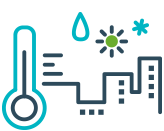Melbourne
Australia
Why RECETAS in Melbourne?
A city where problems of loneliness are observed…
Australians reported feelings of loneliness
%
of the population felt they lack companionship
%
of lonely Australians are more likely to be depressed
%
of lonely Australians are more likely to be anxious about social interactions
… and where the importance of nature is felt.
Adults in neighbourhoods where at least 30% of nearby land was parks, reserves and woodlands had 26% lower odds of becoming lonely compared to their peers in areas with less than 10% green space.
For people living on their own, the associations were even greater – in areas with 30% or more green space the odds of becoming lonely halved.
sources
How will nature-based and social activities be tested?
Our population identifies as LGBTQIA+ refugees and asylum seekers. RMIT will work with the ‘Many Coloured Sky’ foundation, which provides support to LGBTQI+ refugee and asylum seeker communities with capacity building, planning and project development. Specifically, we will work with a peer social support group that meets for activities, excursions, education, referrals, connections, networking, and emotional and practical support.
Non-controlled exploratory complex intervention studies with a pre–post design, with one-year follow-up, will be undertaken.
Quantitative and qualitative methodologies will be applied, with an expected sample size of 50- 75 participants.
Stakeholders will include the City of Melbourne, Parks Victoria, Department of Health Victoria, Switchboard Victoria, ADMA - Australian Disease Management Association and more
About Melbourne
Melbourne is in the south-eastern part of mainland Australia, within the state of Victoria. Home to the First Australians for over 40,000 years, the Melbourne area served as a popular meeting place for local Kulin nation clans. The city is Australia’s second largest and is known as the culture, arts, music and sporting capital if the country. Melbourne has been ranked by the Economist Intelligence Unit as the world’s most liveable city for seven years in a row, from 2011 to 2017.

City population
5 078 million

Population density
22,400/km²

City SDG index
73,9

Subjective well-being ranking
#11 (2020)

Average Temperature
14,5°C

Köppen classification
Oceanic Climate (Cbf)
Get in touch
Are you an organization based in Melbourne and dealing with these topics? Do you want to share your experience ? Are you interested in getting involved in RECETAS activities?
Contact us !
Pr. Katherine Johnson
Dean at the School for Global, Urban and Social Studies
katherine.johnson2@rmit.edu.au
Pr. Sarah Bekessy
Conservation scientist and Convenor of the ICON Science Group at the RMIT Centre for Urban Research
sarah.bekessy@rmit.edu.au
Dr. Nerkez Opacin
Research Fellow
nerkez.opacin@rmit.edu.au
Dr. Nicholas Hill
Visiting Research Fellow
nicholas.hill@rmit.edu.au

